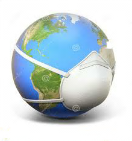
VirtualVillageMom
Reliable Information for Happier, Healthier Lives

Pandemic! Are You Prepared?
According to the World Health Organization (WHO), a pandemic is “the worldwide spread of a new disease…and most people do not have immunity.” The most effective, efficient, timely, and cost-
To prepare for worldwide epidemics, every country must have a national pandemic risk management program in place. This program should include the capacity to develop and respond in all sectors. It is also important to perform forecasts of the national impact in cost-
These procedures should include specific activities to be handled by governmental, nongovernmental organizations and humanitarians. Additionally, there should be a list created with contact information of experts who can provide relative advice. It is also necessary to develop strategies and survived training for all Health Care workers and volunteers to quickly respond during and throughout the pandemic. An assessment should be made to determine how much additional human, and material resources may be needed, as well as the amount of human and material resources available for donation to other countries if necessary.
WHO also recommends a pandemic risk management committee that is a multi-
It is crucial that methods and means of communication also be included in a pandemic risk management plan. Effective strategies to communicate, educate, and inform families, individuals, and the community must be developed. It is important to identify spokespersons, communication channels, and how they will be able to reach target populations. Protocols must be developed as well as training programs for spokespeople and communication channels. Exercises should be conducted to pre-
Additionally, regular briefing updates should be provided to all spokespersons, in order that all communication is consistent. Mechanisms should be activated for the widest dissemination of information. Communication information should include any information known about the virus; for example, how it is being transmitted, how serious it is, and treatment and prevention. Also, communication should cover how widespread the outbreak is, the effectiveness of containment measures, and what will be done next. Additionally, any road, border, or school closures should be announced; along with where to go for medical care and other resources. In its most basic form, preparedness means having detailed answers to five basic questions: Who? What? When? Where? How?
In the event of an emergency or pandemic, your family may be depending on you to know how to get to safety, or where to get resources in the event of an emergency or pandemic. Are you prepared?
Reference
World Health Organization: Global Alert and Response. Retrieved from: http://www.who.int/csr/alertresponse/epidemicintelligence/en/
World Health Organization: Retrieved from: http://www.who.int/influenza/preparedness/pandemic/GIP_PandemicInfluenzaRiskManagementInterimGuidance_Jun2013.pdf
By Donna R. Turner, MPH, CHES

